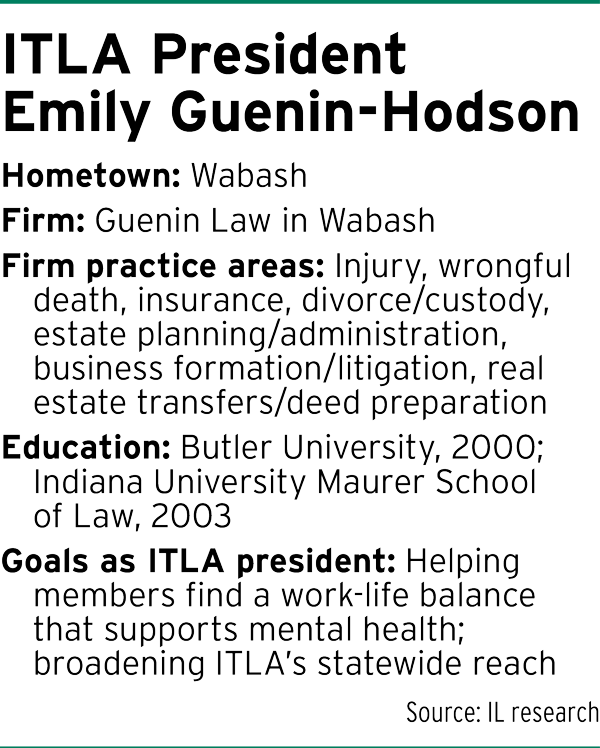Subscriber Benefit
As a subscriber you can listen to articles at work, in the car, or while you work out. Subscribe Now
(Photo courtesy of Guenin-Hodson)
Born and raised in Wabash with a lawyer for a dad, it was certainly natural for Emily Guenin-Hodson to return to her hometown after law school and join her father in the family practice.
But it wasn’t just family ties that drew Guenin-Hodson – the 2023 president of the Indiana Trial Lawyers Association — to plaintiff’s work.
“The passion with plaintiff’s work really started when we saw some of our friends and loved ones being injured and they weren’t getting the assistance that they needed through that process,” she explained. “So we wanted to be there to help them, and then our practice has just grown from that.”
Now in her 20th year of practicing law, Guenin-Hodson has been a member of ITLA since joining her father at Guenin Law P.C. in 2003. With two decades of experience in both the law and the plaintiff’s bar, she said the various roles she’s held within ITLA give her a well-rounded perspective as she takes the helm of the 850-member organization.
As ITLA president — the fourth woman to serve in that role — Guenin-Hodson said one of her main goals for the year is to engage members in discussions about work-life balance and mental health.
“… (W)e can be a better advocate for our clients when we’ve nurtured our relationships with our family and friends and taken into account our mental and physical health,” she said. “So there’s going to be different ways that we work that in as a subtopic in some of our meetings, some of our CLE programming.”
Guenin-Hodson recently spoke with IL about her plans for her year as ITLA president. Part of that conversation, edited for space, follows. The full Q&A is available here.
How long have you been involved with ITLA?
I’ve been involved with ITLA really since the beginning of my practice. Early on, we had a case where ITLA offered amicus assistance with one of our cases, and it went very well, so we got to know the organization through that. So about 20 years ago, and ever since then we saw all the things that ITLA provides not only to its members, but also in assisting people throughout the state, and a lot of it’s behind the scenes. We wanted to be involved with that — I wanted to be involved with that, my dad wanted to be involved with that — because we saw good people doing good work, and that was something we wanted to continue to foster.
 What are your plans for your year as president?
What are your plans for your year as president?
One of the things that I’ve seen develop among my peers, but also through just friends and family, is this struggle with balance — balancing life and mental health aspects. I think a lot of that developed, unfortunately, after COVID — the shutdown we experienced and then coming back out of that, the changes that are there. I also think, though, that it’s something that’s always been an issue to be addressed.
I’m also very fortunate that I have followed presidents who have addressed other issues and concerns that were there, and a lot of those things are now being already taken care of, such as we focused on broadening our reach throughout the state. I’m in Wabash; I’m not in Indianapolis. A lot of our members are throughout the state, so we’ve had some programming throughout the state, we’ve given our membership ways to be involved, even if they can’t be physically present in Indianapolis. We’ve also expanded our membership and developed a mentorship program. So it’s really about listening to the needs of our organization and of our members and trying to assist and foster in the best way we can.
With that mental health and work-life balance issue, do you have specific ideas of what that might look like in practice?
In a couple of different ways. One is, for me personally, I have found the benefit of working in a rural community: I’ve been able to coach my kids in soccer, I can run to school meetings really quickly, I help out with track meets, that kind of thing. And so I think that is one way — just weighing those options as to where you want to physically locate your practice can help with that.
But even aside from that, there are ways that you can implement that regardless of where you’re physically located. Coming up in October, there’s a summit being held in Wabash about mental health (the Mental Health Summit for Rural Justice and Healthcare Professionals). I’m excited to be part of that. It’s going to focus on rural communities and mental health in the justice and medical professions.
Those are just different ways that I see incorporating that into not only my personal life, but also my term is president.
Any challenges you foresee in the year ahead?
Not necessarily challenges, but one thing that I am aware of is our branches of government working together; that’s something that I think can be very can be beneficial, because we do have three branches of government. Obviously, the one that I’m dealing with usually the most is the court system, but I have found through my experiences that there’s a lot of overlap and there’s a lot of cooperation between those branches, and that when our when our government cooperates and provides checks and balances, we enhance society as a whole. One of the things that I really appreciate about ITLA is that our mission statement is, “Dedicated to the constitutional rights of open access to the courts and equal protection under the law for all persons in Indiana.” That really is a theme for all of our governmental branches, so I’m looking forward to the dynamics of working with all of that.
What has been the benefit(s) of ITLA to your career?
The sustaining member Listserv — I really cannot undervalue that. It is an amazing resource in that it is a way for me to reach out to people throughout the state, and you get answers back on that within minutes. Somebody will say, “Oh, I’ve dealt with this, give me a call,” or, “I’ve dealt with this, here’s a case that will help you on this issue.” Sometimes it’s, “I’ve dealt with this, here’s the brief I filed.”
I talked a little bit about the Amicus Committee — that has also been very beneficial to my personal practice, because we’ve taken advantage of the Amicus Committee before where they’ve offered to write briefs and (assist) with our clients on things. Since then, I’ve also served as amicus counsel on several cases in order to provide that assistance back, and I do think it makes my personal practice better, but it also makes for better laws in the state, because if we can provide additional information or insight, then that’s something that judges can take into consideration.
What’s your elevator pitch to a young lawyer considering joining ITLA?
I would say that the one of the benefits of joining ITLA as a young lawyer is the camaraderie that develops and the guidance that you can receive early on so that you can develop good habits and good resources and information from the start of your practice. A lot of times we get doing things because that’s just the way we’ve always done them, but if you can learn from people who’ve been down this path before, then I think that’s fantastic. I always tell people that if I’m off track on something, let me know, because I think that we need to be able to admit when we’re wrong and if we need to correct something or course-correct on an issue. And the nice thing with ITLA is, you’ve got a lot of people who’ve had similar experiences who can help you course-correct.•
Please enable JavaScript to view this content.
